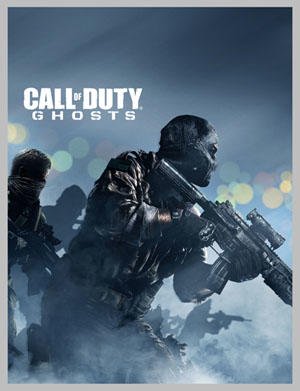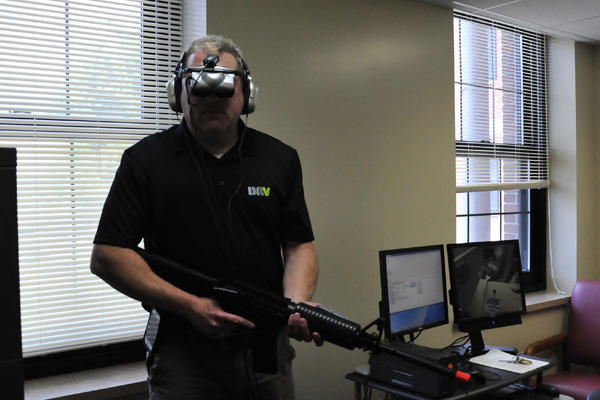Dawn breaks over the village, which like so many others you've seen this tour, is a collection of mud-brick buildings, dusty streets and small, white pickup trucks haphazardly parked on the road. You think to yourself, "Everyone in this region must be issued a white pickup truck." The quiet is broken by the occasional snap, snap of tattered clothes hanging from outdoor lines fluttering in the low breeze.
A dog barks.
A goat brays.
You lead your fire team through the village; each person puts their life in the hands of their buddy a few meters away. The team moves forward in a staggered wedge formation with each person on the alert for enemy threats in their assigned sector of fire.
SMACK
The entire team instinctively flinches at the sound. Some duck, others look for cover, and one starts to raise his weapon. Then the momentary adrenaline rush is over as quickly as it came. Your grenadier has just smacked an annoying desert fly against the back of his neck. He sheepishly mumbles an apology as the fire team moves out. You shake your head and take a deep breath, trying to force your heart rate down.
The chatter of gunfire erupts in what seems like all directions. The team begins to return fire at the muzzle flashes blinking in and out of the darkened buildings in front of you.
You can actually hear the rounds getting closer … then the screen flashes red. Your character in this first person shooter video game re-spawns as your friends, some miles away, are cackling at you in your headset. You swear revenge and attack the digital village again.
This make-believe scenario plays out in various forms every day. Millions of people around the world, including veterans and military personnel, relax by fighting a digital battle with high-definition graphics and realistic sound.
But when players are "killed," they reset and live to fight another day. Video game technology has advanced exponentially over time. The simple joystick, one button controllers of the 1980s have been replaced by multi-button consoles. Three-dimensional graphics and enhanced simulations provide players heightened game experiences.
But this same technology that some service members and veterans call a "hobby," others call "therapy."
Military Members and Video Games
Hank Keirsey, retired Army Lt. Col., master parachutist, Army Ranger and former West Point history and ethics professor, has lent his expertise to the "Call of Duty" (CoD) video game franchise as a military advisor and consultant. He was surprised at the numbers of active-duty personnel playing CoD while they weredeployed in actual combat theaters.
"I'd go wandering off as an advisor to a general, and the soldiers didn't care," said Keirsey. "But when they found out I was involved with 'Call of Duty' they'd stop me and tell me they had ideas for the next one. Those guys were playing these games while at a [forward operating base.]"
 |
But why would someone deployed in a combat zone take pleasure in a simulation of something that could happen for real? Keirsey has a few ideas.
"I think the average Joe on patrol is ready for action but doesn't normally see a lot of action," Keirsey said. "There are countless days slogging through the streets, slogging through the sewage, sweating through your uniform while your brain is armed for a big fight but rarely do you get one."
Keirsey said he believes the appeal of battlefield simulation stems from the fact the service member can sit down in a lounge, under an air conditioner and, in a controlled environment, get hit, see a red flash across the screen and then get right back in the game.
Essentially, they can play out a variety of scenarios and not suffer actual bodily harm.
Retired Marine captain and California DAV Chapter 73 member Dale Dye agrees with Keirsey. "First person shooter video games seem to be all the rage with the active-duty people I talk to about the subject," he said. "There's an element of challenge and personal accomplishment inherent in the form, and I think that appeals to military people for the same reasons that drove them to enlist. They want to test themselves, and I think that's always healthy."
Dye has been a military advisor for the "Medal of Honor" video game franchise, as well as an actor and advisor for more than 40 movies and TV shows, including Platoon, Saving Private Ryan, The Great Raid and Band of Brothers.
"Military themed video games naturally emphasize constant combat, run-and-gun, shoot-and-scoot scenarios," said Dye. "But anyone who has served realizes that kind of thing is only a small part of what you encounter in military service, if you encounter it at all."
However, there are now more veterans, some with visible injuries and some not, in America since World War II. Do first person shooter video games trivialize or make light of a veteran's service? Keirsey said comments like that are, in his experience, usually from people who have never played the game or don't like video games in the first place. In fact, he views games like CoD as an opportunity to tell the story of veterans through a different medium.
"I was reluctant to join [Activision] because I didn't see the connection in video games making the next generation of centurions," he said. "But, the modeling of the weapons, the uniforms … I saw this as an opportunity to teach history from the indirect approach. I've had 13- and 14-year-olds tell me they had no interest in World War II until playing this game."
Keirsey explained he's often been told how the previous CoD games in World War II settings have prompted young people to ask their relatives about their experiences in war.
"It opened the eyes to people who didn't know what Normandy was, where Point de Hoc is or what the Big Red 1 was," he said.
Dye has made similar observations.
"In the original concept for the 'Medal of Honor' series, we intended to reward good play with lessons about World War II history," Dye said. "I'm a big fan of that kind of thing. We need to teach young people about America's military history, and our schools are failing miserably in that regard."
Video Game Technology and Treating Veterans
Moving a joystick and pressing a trigger on a digital battlefield can be more than just entertainment for some veterans. It can actually be a form of treatment. Clinical psychologist Dr. Kathleen M. Chard, with the PTSD and Anxiety Disorders Division at the Cincinnati VA medical center, has more than 20 years in treating mental health disorders.
"It's our hope our current generation of veterans are comfortable and familiar with this type of technology," Dr. Chard said. "We want to remove the stigma of seeking help for them."
Dr. Chard explained the goal of this type of therapy, called Virtual Reality Exposure (VRE) therapy, is to help veterans process the traumatic memory so it no longer controls their life. The treatment procedure would be familiar to a veteran who has played a video game like the CoD franchise. The patient is given a control stick, similar to a video game console joystick, which is attached to a weapon, a pair of virtual reality glasses and headphones.
There's even a machine in the room that can replicate smells familiar to this generation of veterans.
The marketplace.
Burning fuel.
The smell of cordite associated with explosives or gunfire.
The goal is to recreate the scene of the traumatic event in painstakingly accurate detail and change the veteran's perception of what happened.
"The VRE treatment allows us to trigger memories about the event to obtain the full story," said Dr. Chard. "Once these memories are triggered, we can challenge those misperceptions in the veteran's mind, including areas where they may be blaming themselves for things they could not have controlled or predicted."
Dr. Chard said a symptom of PTSD is for veterans to avoid the emotional state of the traumatic experience and to shut down emotionally out of fear of reliving the event. But, she says, experiencing emotions and moving forward are a natural part of life for human beings.
"The virtual reality technology allows us to put details in front of them and challenges the misperception the veteran may have about the event," said Dr. Chard. "It allows them to process the emotion."
The Veteran Connection
Keirsey believes first person shooters like "Call of Duty" can resonate with veterans. He said veterans and military personnel will be able to identify with many aspects of this year's much-anticipated title, "Call of Duty: Ghosts." The premise behind the storyline of the game is that the United States is no longer a superpower, merely a shadow of its former self. A group of special operations forces from each branch of service form an elite unit to defend the homeland.
"It's a dystopian world," Keirsey said of the new title. "We're now the underdog, and bad things have happened."
"CoD: Ghosts" involves different scenarios and tactics than previous CoD titles for the gamer to advance through the story. An interesting twist, which Keirsey believes will appeal to anyone who has served in uniform, is the emphasis on subunit integrity.
"This is what you identify with," he said. "You've got this guy on your left and right and your squad leader. You really learn about your squad and feel like you're a member of a team."
Different Perceptions
Dye said there seemed to be two schools of thought among military people and veterans regarding first person shooter games. One group tends to be service members whose job involves direct combat action, and they find the game an entertaining distraction, as no one actually gets hurt, or worse, if they make a mistake. The other group is usually not engaged in direct combat, and they enjoy games like CoD and other first person shooters because it's as close as they'll get to combat.
"I understand the motivations in both camps, and I don't think there's any harm in it," he said.
Both Keirsey and Dye said the games should be considered authentic; but, they should never be called "real."
"We're making a game," said Keirsey. "This is entertainment; this is a gaming product."
Keirsey said games like these can give people who've never served a small perception to what veterans have experienced.
"Less than one half of one percent in this generation have been in uniform," he said. "You'll find whole towns without a military family. These games, I think, one side effect that can develop is respect for people who've served."
"The product honored the folks who were out there. It made a gamer get a better idea of what a bad day in Fallujah would look like."
Keirsey added there's no way games like those in the CoD franchise could depict what a veteran goes through in reality.
"It's not realistic," he said. "There's no sweat, no dirt, no waiting three to four weeks to cross the border and no bad food."
Dye agreed by saying gamers in uniform know the difference between a video game and the "real deal," and the "morality" question of video games depicting military combat is certainly not a question to be asked of a video game producer.
"I don't know if video games are the right place to teach young people about things like selfless service, sacrifice, dedication, patriotism and teamwork," he said. "[It] seems to me those valuable things should be taught by parents in the family setting and then possibly reinforced by service in uniform."
However, what is real and arguably moral is that the technology found in video games is available to treat mental health disorders affecting so many veterans. Dr. Chard said 70 percent of her patients, mostly of Vietnam veterans, using VRE therapy no longer have PTSD symptoms after seven to 15 sessions. The remaining 30 percent show improvement.
"Whether you like video games or not, they have changed the way we communicate and can change how people see military service," said DAV National Adjutant Marc Burgess. "But, Dr. Chard and her team at the VA are seeing positive results stemming from a platform very familiar to many veterans. I'd encourage any veteran experiencing mental health issues to talk to their health care provider and explore all treatment options, including VRE."
DAV is the most long-lasting veterans advocacy and assistance group in this country. We've watched this country change and grow, and we've grown along with it. However, DAV has never wavered in its core mission to fulfill our country's promises to the men and women who served. We invite everyone, veterans and civilian, men and women, young and old, to join us as we stand up for those veterans who risked it all when they stood up for us, our country, and our ideals.










